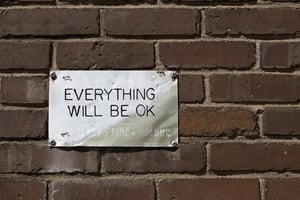How’s your day going?
We have largely stayed clear of looking at the interviews produced by our politicians during the general election campaign.
But now that we have cast our votes and the campaigning has finished, we can say that it was the media training gift that just kept on giving.
From politicians losing their composure and seemingly forgetting they were on camera to the inevitable number muddles and hot-mic disasters, the election provided us with plenty of case studies for our media training courses.
In fact, there seemed to be far more chaotic and damaging interviews than good ones.
Here are the interviews that stood out for us for all the wrong reasons.
Hot mic shambles
Many politicians have fallen foul of the hot mic. The most infamous example of this was Gordon Brown and his ‘bigoted woman’ disaster.
This year, the seemingly traditional election hot-mic episode was provided by Conservative candidate Lee Anderson.
Michael Crick, from the Mail Plus – a digital version of the Daily Mail – was filming Mr Anderson as he went door-knocking.
But when Mr Anderson made a phone call, which he said was to do with some leaflets, he forgot his microphone was on and was caught calling someone up to stage them for the cameras as a friendly voter.
He said: “Just make out you know who I am, that you know I’m the candidate but not a friend, all right. I’m at the carpark, have a quick look, yeah? All right, I’ll see you in a minute.”
If that wasn’t embarrassing enough, the set-up went even more awry when the resident described Anderson’s plan for social housing tenants to be housed in tents and forced to wake up at 6am to pick vegetables as ‘too soft’. He instead recommended a ‘cat o’ nine tails’ and putting them in a ‘pink tutu’.
To complete an embarrassing episode for Mr Anderson, he had earlier replied ‘no comment’ to questions from the journalist about his controversial proposal.
Numbers muddle
It wouldn’t be an election without an excruciating on-air numbers muddle.
And this time it was Labour’s Dawn Butler who produced the gaffe during an interview with Nick Ferrari on LBC.
Ms Butler claimed there were 3,000 rough sleepers in the London borough of Brent, an assertion that Mr Ferrari doubted.
When he asked her for the national figure she said she didn’t know and this caused the pressure to ramp up.
He said: “So you're pledging to end rough sleeping but you don't know how many people you've got to help?”
Ms Butler replied, after a long pause: “I don’t know all the figures and all the numbers.”
“Don’t you think you should have been armed with those figures?”, Mr Ferrari asked.
When Ms Butler claimed that homelessness was not part of her brief, Mr Ferrari said: “So why are you talking about it?
“What I find incredible Dawn Butler is that you say 3,000 people sleep rough in Brent, well the last figures we have from 2017 is that there was 4,751 people sleeping rough in the whole of England, of which 3,000 were in Brent! Are you sure you've got your figures right?”
Ms Butler later took to Twitter to admit she had “made a mistake.”
Lack of composure
Labour chairman Ian Lavery provided a great example of how not to handle difficult questions when he was asked why the National Union of Mineworkers had paid off his mortgage.
Michael Crick, who is about to join the Media First team of tutors, asked the politician about the payment 15 times during an interview for Mail +.
The interview came days after Mr Lavery featured in a campaign video that accused the Tories of ‘stealing the miners’ pension fund’.
When he was asked if he had a ‘bit of a cheek’ appearing in the video with the money he had received from the union, Mr Lavery said: “Instead of coming here making this personal, concentrate on what the Labour Party have got to offer.”
As the question was repeatedly put to him, Mr Lavery became increasingly angry and accused the journalist of ‘interrogating him’. He asked Mr Crick how much he earnt, told him to be ‘grown-up about things’ and asked him to change the line of questioning before walking off.
I’ll leave the media training advice for this one to Michael Crick. He said: “He should have known in advance what I was likely to ask and worked out a reasonable reply. He had been tipped off that we were waiting for him. His bad-tempered, bullying response only promoted an almost wholly negative reaction on Twitter.
Forgetting you are on camera
When Boris Johnson made a cut-throat gesture during an interview with Nick Ferrari on LBC, it caused many to speculate that he was unhappy with the line of questioning on social care and wanted it stopped.
Did... did he forget he's on camera? pic.twitter.com/GNA2eZu3AD
— Adam Bienkov (@AdamBienkov) November 29, 2019
The printed media also picked up on it:




